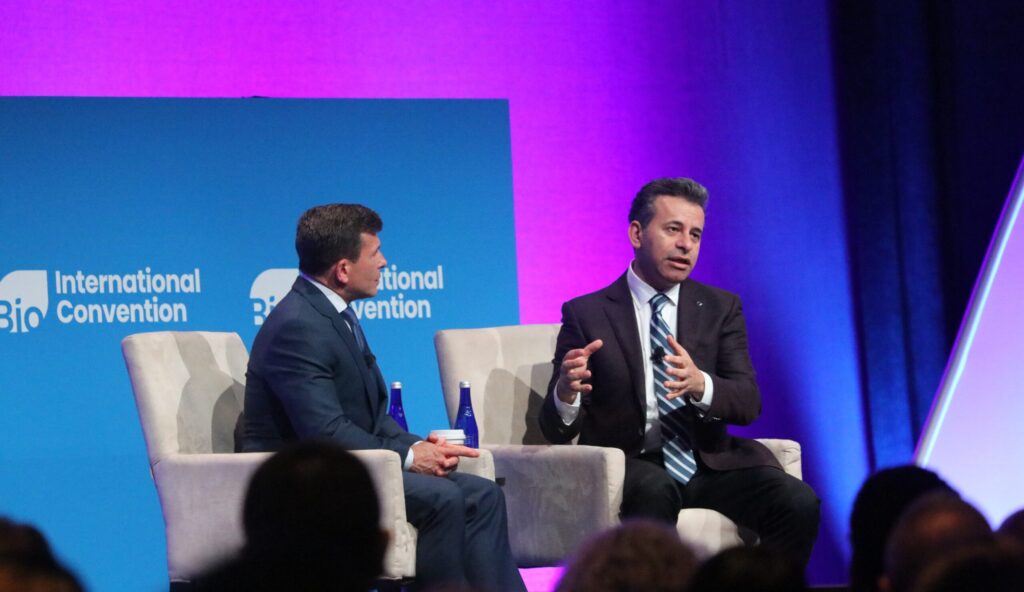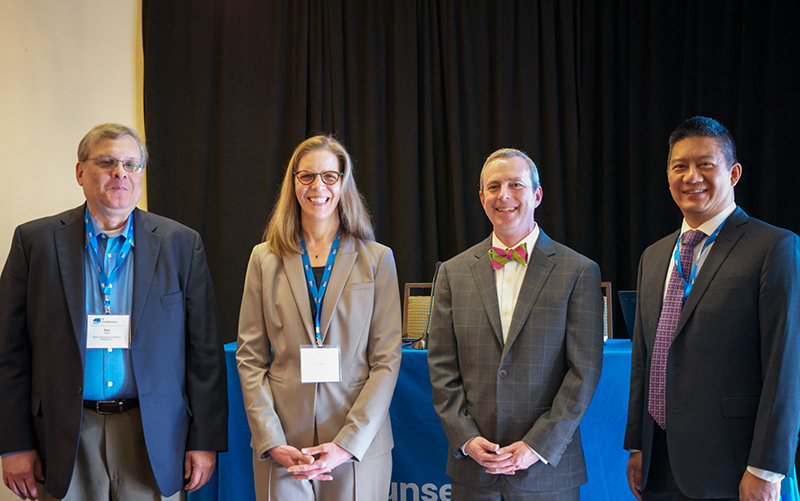Food and Drug Administration (FDA) Commissioner Martin A. Makary, M.D., M.P.H., sat down with the Biotechnology Innovation Organization (BIO) President and CEO John F. Crowley to discuss his vision for the FDA.
“It’s been exhilarating to meet so many of you,” said Dr. Makary, who assumed his role in March 2025. “And also hear what your ideas are for the FDA.”
He discussed topics including communication with sponsors, structural and staffing changes at FDA, and why he’s excited about AI. Here are a few highlights.
‘I believe in listening’
Dr. Makary noted that he participated in a meeting with biotech leaders while in Boston.
“I believe in listening. I’ve always said that what makes a great physician is not how much you know, it’s your humility, it’s your willingness to evolve your thinking on a topic as new data comes in. I’ve said that to every medical student that I’ve had the privilege of training,” he said.
“And so we want to stand before you and listen and hear your ideas on the FDA.”
One theme he said he has heard: “that we at the FDA could do a better job communicating with sponsors. A 15-minute call could save a company months of doing guesswork. And, honestly, we owe it to our sponsors. This is just good professionalism. It has tremendous benefits to society if we can do this properly.”
Structural changes at the FDA
Dr. Makary discussed his efforts to maintain the FDA’s ongoing work, as well as what changes he has started implementing.
“I came in just after the DOGE [Department of Government Efficiency] cuts at the agency, and it was a challenge. We had to make sure that all the core staff had all the resources they needed to do their job well, and that means keeping all the trains running on time,” he said.
“I’m proud to report that we’re on track to meet all our different targets, and that morale is good and improving,” he continued. “The agency is strong, and my job is to make sure that every scientist and inspector and law enforcement official at the FDA has all the resources they need to do their job well.” (He noted there were no cuts to reviewers or inspectors.)
He said the agency wants to replenish staff with people from both the inside and from the outside, “with fresh new ideas and new perspectives.” However, the agency also wants to reduce redundancy to make the review process more efficient. He noted that the agency staff increased by 100% since 2007.
“We do need a strong FDA, and the FDA is strong,” he said. “Now, if this increase is for scientific work, then that makes sense, but when there are tremendous redundancies in IT, or communications, or legislative affairs, or in the 12 travel offices, or in the HR staff, those are opportunities for us to create more efficiencies and ultimately improve morale.”
He said his goal is to return to 2019 staffing levels; the agency is currently at 2020 or 2021 levels.
“The most important thing is that no corners are cut on the scientific evaluation process,” he stated.

The just-announced Commissioner’s National Priority Voucher (CNPV) pilot program
Dr. Makary discussed the FDA’s CNPV pilot program, which was announced earlier the same day.
“The new voucher may be redeemed by drug developers to participate in a novel priority program by the FDA that shortens its review time from approximately 10-12 months to 1-2 months following a sponsor’s final drug application submission,” per the administration’s press release.
Dr. Makary said the program essentially allows the “lion’s share” to be submitted before the final New Drug Application (NDA) or Biologics License Application (BLA) “to take advantage of the time that is spent watching a clinical trial reach its end points.”
“And that way, once the final clinical trial results come in, they can be submitted, essentially as an addendum, or a part two,”
he continued. He believes the review could be done in 1-2 months instead of the standard 10-12 months.
AI at the FDA
Dr. Makary also discussed the introduction of the FDA’s new AI tool, ELSA, “a generative Artificial Intelligence (AI) tool designed to help employees—from scientific reviewers to investigators—work more efficiently.”
“I’m really excited about ELSA,” he said, noting that he brought in AI experts “on Day One” and spoke with people across the agency and industry about their AI wishlist.
Industry “wanted assurances that the AI machine learning was not learning on their proprietary products. And so we made sure of that.”
He recalled how one reviewer said the tool reduced a process that would normally take 2-3 days to just 6 minutes.
The tool launched agency-wide two weeks ago “ahead of schedule and under budget.” Already, thousands of FDA staff are using the tool, which is still optional. Version 2.0 is expected to be available in a couple of weeks.
The BIO-FDA partnership continues
The conversation touched on a number of topics, showing the importance of partnership between “the new FDA” and industry partners.
The 2025 BIO International Convention was undoubtedly just one of many future steps.
As the conversation concluded, John F. Crowley thanked the commissioner for his “time and your commitment and services to this country.”




